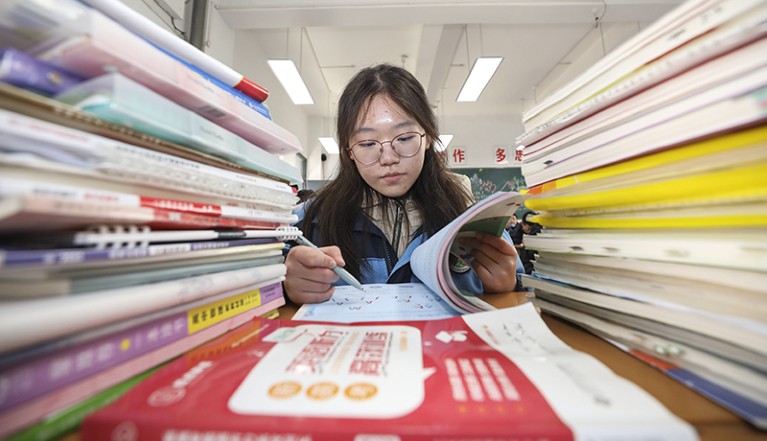
By the time Jane Tian had completed her undergraduate and master’s degrees at Shandong University in Jinan, China, she was ready for a change. “I was bored with the teaching style in mainland China,” she says. Tian, who wanted to specialize in sociology, thought that gaining “an international perspective” would give her an edge in finding a job in China.
In late 2019, Tian applied to 15 PhD programmes from around the world, with the United Kingdom as her preferred location. Places she left off her shortlist included the United States, she says, due in large part to China’s “quite tense relationship” with the country.
Tian ended up choosing Lingnan University in Hong Kong, which offered her a PhD programme with a competitive scholarship and access to leading supervisors in her field. She also liked the fact that Hong Kong shared certain similarities with mainland China, yet provided an opportunity for more diverse types of learning. “The mixture of Chinese and Western cultures in Hong Kong, which has shown itself to be an inclusive and vibrant community, is what most attracted me to study there,” she says.
Two years into her PhD in sociology and social policy, Tian says she made the right decision. “Hong Kong is really a very good choice for me,” she says. “I’ve been able to enhance my research abilities.”

Nature Index 2023 China
Over the past decade, the number of students from mainland China studying abroad has been increasing year by year, peaking at 710,000 in 2019. Movement has slowed since the early stages of the COVID-19 pandemic, but it’s not yet clear by how much. According to the Open Doors Report, published by the New York-based Institute of International Education (IIE), the number of new Chinese scholars studying in the United States declined by 10.6% in 2019–20; by 38.7% in 2020–21; and by 26.1% in 2021–22. At the time of writing, China’s Ministry of Education has yet to release numbers post-2019.
Yifu Wang, a conservation social scientist from Zhengzhou, China, received her undergraduate degree from McGill University in Montreal, Canada, and completed her PhD at the University of Cambridge, UK. She is currently pursuing a postdoc at Hong Kong University. Wang says she had hoped to undertake a second postdoc in Australia, Europe or the United States, but the pandemic changed everything. “Due to travel restrictions in mainland China, I wouldn’t be able to travel back home easily,” she says. Although restrictions are finally easing, says Wang, “my long-term career plan has changed to staying in Hong Kong”.
Despite the lack of Chinese government data, there are signs that more Chinese students are choosing to enrol in schools nearer to home, says Ye Liu, who studies international development at King’s College London. The pandemic is partly the cause, she says, but other factors now seem to be affecting students’ preferences, including an increase in anti-Chinese sentiment in some countries, and mounting geopolitical tensions between China and the West.
Australia, for instance, has been a destination of choice for Chinese students, but in recent years has seen a downturn, coinciding with the nation’s increasingly tense relations with China, and the pandemic. Since 2020, Australia has recorded falling numbers of Chinese students, about 10% year on year.
Changing preferences
At the same time, China is becoming a more attractive study destination itself. “The regional universities in mainland China and Hong Kong have become really good, so students have less of a reason to travel so far,” says Andrea Braun Střelcová, who studies higher education with a focus on China, at the Max Planck Institute for the History of Science in Berlin. “It just happens that the best education possible doesn’t need to be an expensive overseas degree anymore.”
Chinese students once accounted for one-third of all international students enrolled at colleges and universities in the United States, about 370,000 students in total, according to IIE data captured before 2020. Data on student visas issued to Chinese nationals in the past two years, however, suggest that numbers almost halved from around 100,000 in 2021 to 58,000 in 2022. “Before the pandemic, the United States was the number-one choice for Chinese international students,” says Liu. Now, “pathways for Chinese international students are becoming more diversified”.
The United Kingdom “has become a very popular destination for Chinese international students”, says Liu. In a March 2020 survey of 6,673 mainland Chinese students and parents, led by New Oriental, a private education service provider in China, the United Kingdom outranked the United States for the first time as the top choice for Chinese students studying abroad. More recent visa-application data show a 13% decline in sponsored study visas for Chinese students in 2022, contrasting with a return to pre-COVID numbers in 2021.
Worsening relations with the United States are a major factor in pushing Chinese students to consider other options for their education, says Xiaofeng Wan, associate dean of admission and coordinator of international recruitment at Amherst College in Amherst, Massachusetts. “Chinese families are really concerned about throwing all of their eggs into one basket, which is the United States,” he says. “Everything is signalling to them that things can change fast, in a very negative direction for Chinese students.”
Since 2020, the US government has been denying visas for science and engineering graduate students who have studied at a Chinese institution it alleges has ties to Chinese military programmes. In the summer of 2022, the United States issued approximately 45% fewer visas to Chinese students compared with the same period in 2021, according to the US-based Chronicle of Higher Education.

The US Department of Justice launched its China Initiative in 2018, which investigated certain Chinese nationals who were working in the United States for evidence of academic espionage. The initiative triggered the departure of an estimated 1,000 Chinese researchers and led to arrests of several scientists. Many of the charges were dropped by 2021, but the negative perception created by this and other events, including an increase in hate crimes, has had a serious impact on Chinese student and parent decision-making, Wan says. The decline of Chinese student enrolment “is definitely a great loss for the United States”, Wan adds, and “is the gain of our competitor nations”.
Repercussions might soon be felt by US universities. For every 1,000 PhDs that have been denied by the US government, US institutions will lose nearly US$1 billion in tuition fees, and an estimated $210 billion in patents over the next decade, according to a 2021 analysis from the US National Foundation for American Policy. Chinese students contribute an estimated $15.9 billion to the US economy annually, according to an analysis by the IIE, including to small college towns that rely on student dollars.
US professors have come to depend on a steady flow of top Chinese graduate students to fill their labs, says David Zweig, an emeritus social scientist at the Hong Kong University of Science and Technology, and these relationships have contributed to “the massive collaboration” between scientists in the United States and China. “In the past, this has built up the bonds of joint scientific research, which is now under attack, to a certain extent,” he says.
Homegrown scholars
Even before the pandemic, Hong Kong was gaining popularity among students in mainland China. Enrolment in Hong Kong universities by students on the mainland jumped by nearly 7% between 2018 and 2019. Part of this growing interest might simply be a numbers game, says Ka Ho Mok, vice-president of Lingnan University. Mainland China produces more than 10 million graduates annually, according to Mok, and competition is fierce for positions at top universities there, such as the University of Chinese Academy of Sciences in Beijing and the University of Science and Technology of China in Hefei, the two leading Chinese academic institutions in the Nature Index.
Hong Kong also has its own appeal. Among its eight public universities, four are ranked in the top 120 of the Nature Index. It’s considered to be “a safe place, close to home”, Mok says, where discrimination is rare and tuition costs are affordable. Chinese parents often play a crucial role in determining where their children go to school, Wan says, and the pandemic and political atmosphere have made some reluctant to send their children to distant countries. Tian’s parents, for example, who are based about 643 km south of Beijing, in the city of Zibo, were happy with her choice to study in Hong Kong, as she would be studying closer to home.

Culturally, Hong Kong also feels “very Chinese”, Mok adds, but most faculty members are internationally trained. The diversity might also be higher at Hong Kong institutions than at those on the mainland, with a mix of students from Europe, North America and Australia, as well as other Asian countries. Emigration pathways offered by several Western countries in 2020 in response to Beijing’s Hong Kong security law could alter this mix in the future, however. There have been 64,000 withdrawals from the local school system, including international schools, in the past two years, according to data from Hong Kong’s Education Bureau quoted in the South China Morning Post, although officials expect these dropout rates to fall.
Like Hong Kong, Macau offers students from the Chinese mainland a ‘more open’ culture and close proximity to home, Zweig says. Macau’s universities are not ranked as highly as Hong Kong’s; the University of Macau, for example, is ranked 117th among Chinese institutions in the Nature Index. Studying in Macau does come with the benefit of not requiring the gaokao, however, which is a standardized exam that’s mandatory for mainland Chinese university admittance. “That exam is becoming increasingly difficult,” says Meng Ioeng, who studies Chinese politics at the University of Macau. “That becomes a practical factor for why, in the past few years, more mainland students are coming to Macau.”
More Chinese students are also opting to stay on the mainland. “It used to be the case that you’ve got to go to an Ivy League school in the United States in order to get a good job in China,” Liu says. “But now we’re seeing students getting several Ivy League offers and still choosing to stay in China.”
There are several factors behind this, including “political signals in China that have strongly reduced the motivation to go abroad”, and an emphasis on the achievement of Chinese institutions, says Anna Lisa Ahlers, head of a China-focused research group at the Max Planck Institute for the History of Science.
This is partly the result of a decades-long government strategy to transform China into a world leader in science and education. China has launched several initiatives to support these efforts, including the Thousand Talents programme in 2008, which encouraged Chinese scholars abroad to return home, and sought to retain top young talent. The Made in China 2025 initiative, launched in 2015, is focused on strengthening China’s information-technology, robotics and artificial-intelligence sectors and reducing the country’s reliance on Western technologies.
China’s growing prowess in science and education is a positive development for the country, but too much insularity could limit research gains, Mok warns. “If we collaborate, we bring benefits to all,” he says. “We don’t have to perceive this as a zero-sum game.”
There are some signs that interest in studying abroad is reigniting. The graduating class of 2025 for China’s international curriculum schools, which prepare high-schoolers for study abroad, is currently 42% larger than the graduating class of 2021. Those students will be watching the news closely when it becomes time to make decisions about where to apply. “As long as there are uncertainties between the United States and China,” says Wan, “I think Chinese families will continue to branch out” to other countries.
Chinese students stay local as favour falls with study abroad - Nature.com
Read More
No comments:
Post a Comment